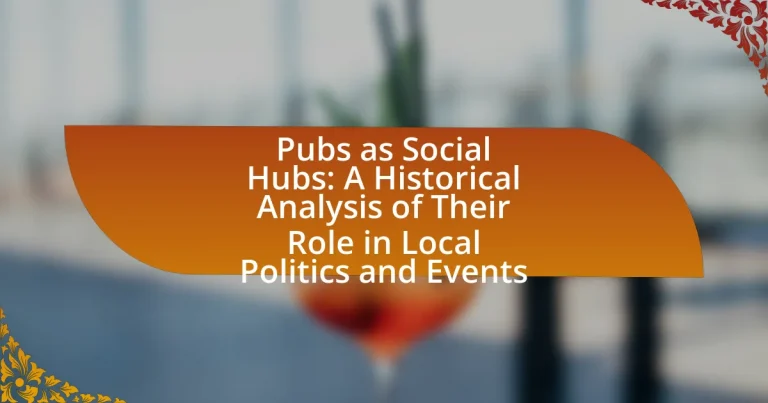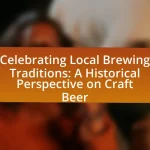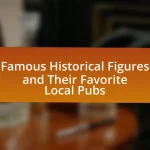Pubs have historically played a significant role as social hubs in local politics and community events. They have served as informal meeting places for political discourse, community organization, and civic engagement, influencing major historical movements and local governance. The article explores the evolution of pubs from simple drinking establishments to multifunctional venues that host political discussions, community events, and social gatherings. It highlights their impact on local political decisions, the types of events they facilitate, and the ways they adapt to changing societal dynamics, emphasizing their ongoing relevance in fostering community ties and democratic participation.
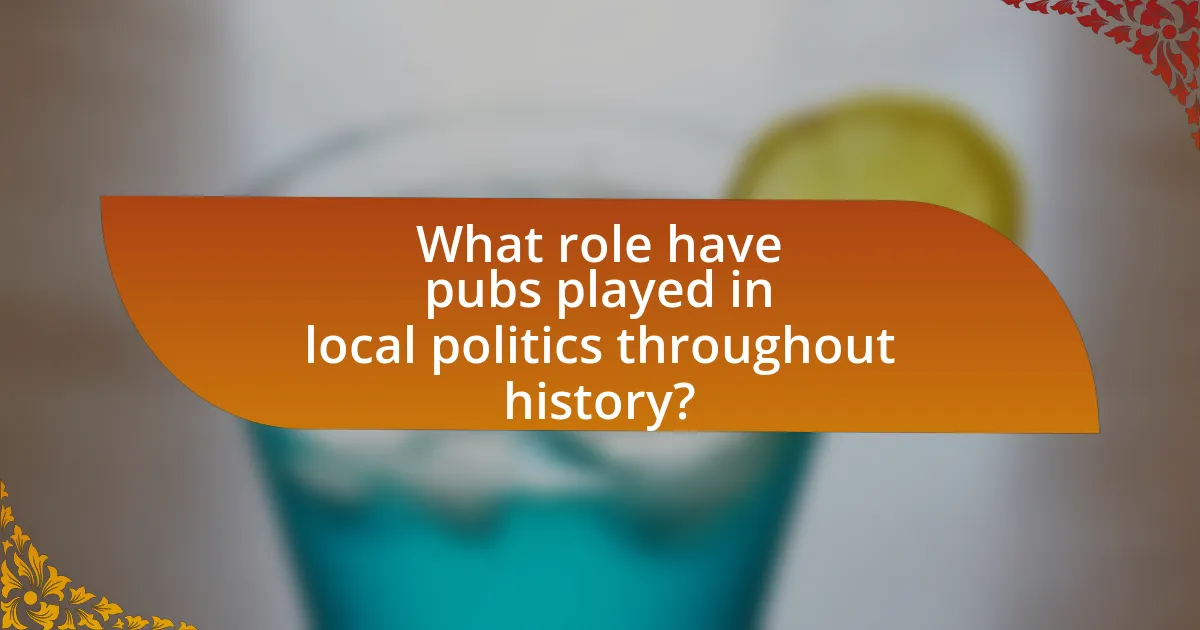
What role have pubs played in local politics throughout history?
Pubs have historically served as crucial venues for local political discourse and community organization. Throughout history, they have functioned as informal meeting places where citizens gather to discuss political issues, campaign for local candidates, and mobilize support for social movements. For instance, during the 19th century in England, pubs were often the sites of political rallies and debates, significantly influencing local elections and public opinion. Additionally, many political groups, such as the Chartists, utilized pubs to disseminate their ideas and rally support among the working class. This role as a social hub for political engagement has persisted, with pubs continuing to be spaces where local issues are debated and community ties are strengthened.
How have pubs served as venues for political discussions?
Pubs have served as venues for political discussions by providing informal settings where individuals can gather, share ideas, and debate issues. Historically, pubs have been central to community life, acting as spaces for social interaction and civic engagement, particularly in the UK. For example, during the 19th century, pubs became known as “political clubs,” where working-class men discussed reforms and labor rights, significantly influencing local politics. The presence of newspapers and pamphlets in these establishments further facilitated informed discussions, allowing patrons to engage with current events and political ideologies. This tradition continues today, as many pubs host political events, debates, and community meetings, reinforcing their role as vital hubs for democratic discourse.
What historical events were significantly influenced by pub discussions?
Pub discussions significantly influenced events such as the American Revolution and the French Revolution. In the American colonies, taverns served as venues for political discourse, where ideas about independence and resistance to British rule were exchanged, notably during gatherings like the Boston Tea Party in 1773. Similarly, in France, cafes became centers for revolutionary thought, where intellectuals and activists debated ideas that fueled the uprising against the monarchy in 1789. These discussions in public houses played a crucial role in shaping public opinion and mobilizing support for revolutionary actions.
How did the layout and atmosphere of pubs facilitate political engagement?
The layout and atmosphere of pubs facilitated political engagement by creating informal spaces for discussion and interaction among community members. Pubs often featured communal seating arrangements and open layouts that encouraged patrons to engage with one another, fostering a sense of camaraderie and shared purpose. Historical evidence shows that during significant political movements, such as the Chartist movement in the 19th century, pubs served as meeting points where individuals could gather to discuss ideas, organize events, and mobilize support. This environment not only made political discourse accessible but also helped to democratize participation in local politics, as individuals from various social backgrounds could come together in a relaxed setting to share their views and influence one another.
In what ways have pubs contributed to community organization?
Pubs have significantly contributed to community organization by serving as venues for social interaction, political discourse, and local events. Historically, pubs have acted as informal meeting places where community members gather to discuss local issues, fostering civic engagement and collective action. For example, during the 19th century in the UK, pubs were pivotal in organizing labor movements and political rallies, as they provided a space for workers to unite and strategize. Additionally, many pubs host community events, such as fundraisers and local club meetings, which further strengthen community ties and promote local initiatives. This role as a social hub has been documented in various studies, highlighting the importance of pubs in enhancing community cohesion and participation in local governance.
What types of community events have been hosted in pubs?
Pubs have hosted a variety of community events, including trivia nights, live music performances, charity fundraisers, sports viewing parties, and community meetings. These events serve to engage local residents, foster social connections, and support local causes. For instance, trivia nights often attract regular patrons and new visitors, enhancing community interaction. Live music performances provide a platform for local artists while drawing in crowds, and charity fundraisers enable pubs to contribute to local initiatives, reinforcing their role as community hubs.
How have pubs acted as meeting points for local activists?
Pubs have served as crucial meeting points for local activists by providing a communal space for discussion, organization, and mobilization. Historically, these establishments have been accessible venues where individuals can gather informally, fostering a sense of community and shared purpose. For example, during the 19th century in the UK, pubs became known as “political clubs,” where workers and reformers would convene to discuss labor rights and social issues, significantly influencing local political movements. This trend continues today, as many grassroots organizations utilize pubs for meetings and events, leveraging their relaxed atmosphere to encourage participation and dialogue among community members.
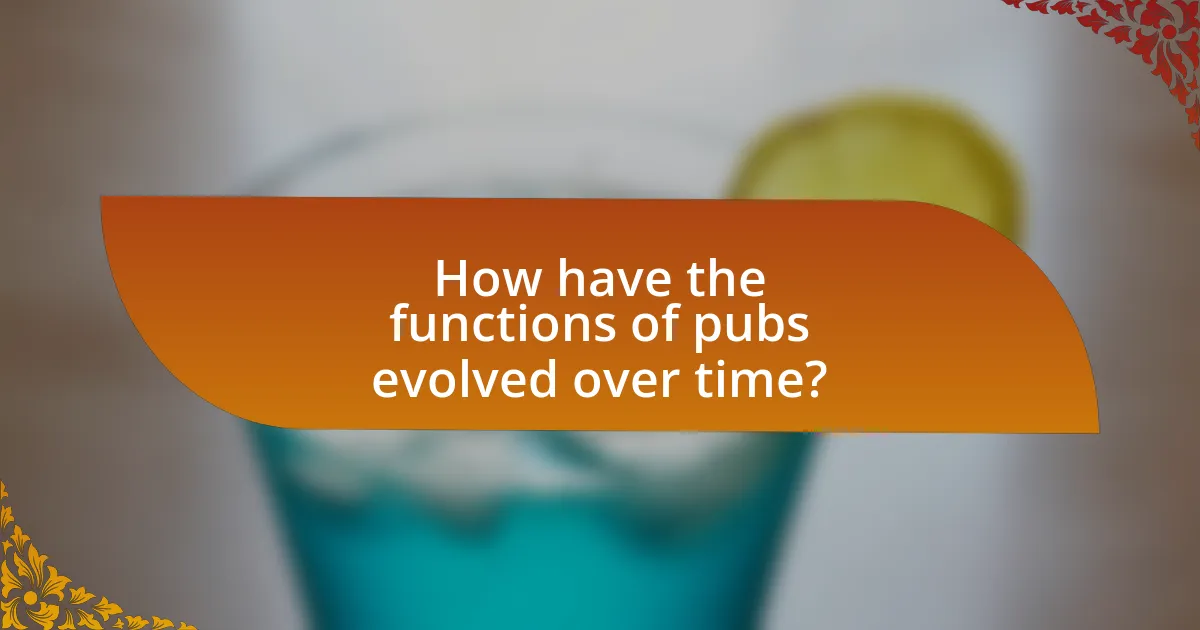
How have the functions of pubs evolved over time?
The functions of pubs have evolved from primarily serving as places for drinking and socializing to becoming multifunctional community hubs that host events, provide dining options, and facilitate local political discussions. Historically, pubs were essential for social interaction and community bonding, often acting as informal meeting places for local governance and decision-making. Over time, particularly in the 20th century, the introduction of food services, entertainment, and themed events transformed pubs into venues that cater to a broader range of social activities, reflecting changing societal norms and consumer preferences. This evolution is evidenced by the rise of gastropubs and the integration of live music and community events, which have solidified their role as vital centers for local culture and engagement.
What changes in society have influenced the role of pubs?
Changes in society, such as urbanization, shifts in social norms, and the rise of digital communication, have significantly influenced the role of pubs. Urbanization has led to increased population density in cities, making pubs more accessible as social gathering places. Additionally, evolving social norms have transformed pubs from primarily male-dominated spaces into inclusive environments for diverse groups, including women and families. The rise of digital communication has also altered how people socialize, with pubs adapting by offering events and experiences that encourage in-person interaction, thus maintaining their relevance as community hubs. These societal changes underscore the evolving function of pubs in fostering social connections and community engagement.
How did the Industrial Revolution impact the pub culture?
The Industrial Revolution significantly transformed pub culture by increasing urbanization and creating a demand for social spaces among the growing working class. As factories emerged and populations swelled in cities, pubs became essential venues for workers to gather, socialize, and discuss political issues, reflecting their role as social hubs. Historical records indicate that by the mid-19th century, the number of pubs in industrial cities surged, with establishments often serving as informal meeting places for labor movements and political activism, such as the Chartist movement advocating for workers’ rights. This shift not only solidified the pub’s status in local communities but also intertwined it with the socio-political landscape of the time.
What role did pubs play during significant historical periods, such as wars or economic crises?
Pubs served as crucial social hubs during significant historical periods, such as wars and economic crises, by providing a space for community gathering, information exchange, and political discourse. During World War I and II, for instance, pubs became venues for rallying support for the war effort, where patrons engaged in discussions about national morale and shared news from the front lines. Additionally, during the Great Depression, pubs offered a sense of community and solidarity, allowing individuals to connect and share resources in times of economic hardship. Historical records indicate that these establishments often hosted meetings for local political movements, further solidifying their role as centers for civic engagement and social support during turbulent times.
How do modern pubs continue to serve as social hubs?
Modern pubs continue to serve as social hubs by providing a communal space for social interaction, entertainment, and community engagement. They host events such as trivia nights, live music, and sports screenings, which attract diverse groups of people and foster connections among patrons. According to a study by the British Beer and Pub Association, pubs contribute significantly to local economies and community cohesion, with 80% of people believing that pubs play an important role in bringing communities together. This reinforces their status as vital social venues where individuals can gather, share experiences, and participate in local culture.
What contemporary events are commonly held in pubs today?
Contemporary events commonly held in pubs today include trivia nights, live music performances, sports screenings, and community gatherings. Trivia nights engage patrons in friendly competition, fostering social interaction, while live music performances often feature local artists, enhancing the cultural atmosphere of the pub. Sports screenings attract fans who gather to watch games together, creating a communal experience. Community gatherings, such as charity events or local meetings, utilize the pub as a space for social engagement and civic participation, reinforcing the pub’s role as a social hub in local politics and events.
How do pubs adapt to changing social dynamics in local communities?
Pubs adapt to changing social dynamics in local communities by modifying their offerings and services to meet the evolving preferences of patrons. For instance, many pubs have diversified their menus to include healthier food options and craft beverages, reflecting a growing trend towards wellness and artisanal products. Additionally, pubs often host community events, such as trivia nights or live music, to foster social interaction and engagement, which aligns with the increasing demand for social experiences over traditional drinking establishments. Research indicates that pubs that actively engage with their communities, such as by supporting local charities or hosting cultural events, see increased patron loyalty and foot traffic, demonstrating their role as vital social hubs.
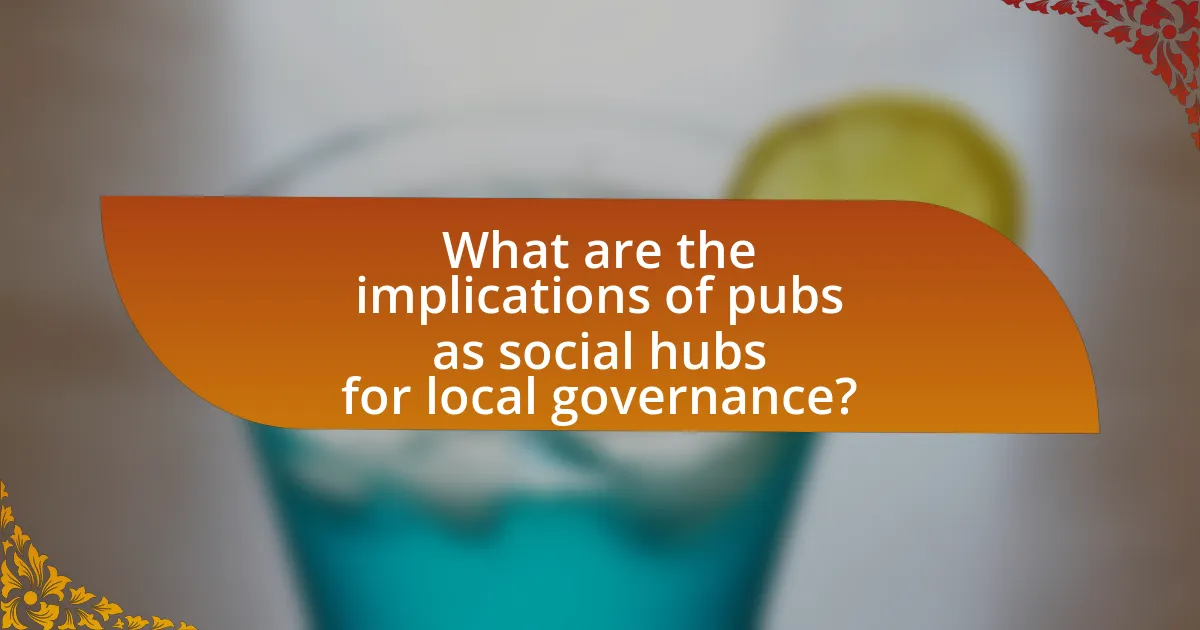
What are the implications of pubs as social hubs for local governance?
Pubs serve as vital social hubs that significantly influence local governance by fostering community engagement and facilitating political discourse. These establishments provide a space for residents to gather, share ideas, and discuss local issues, which can lead to increased civic participation and awareness. Historical evidence shows that pubs have historically been venues for political meetings and grassroots organizing, exemplified by their role in the formation of local political movements in the UK during the 19th century. Furthermore, studies indicate that communities with active pubs often exhibit higher levels of voter turnout and local activism, demonstrating the correlation between social interaction in these spaces and enhanced democratic engagement.
How do pubs influence local political decisions?
Pubs influence local political decisions by serving as informal gathering places where community members discuss issues and mobilize support for political causes. These establishments often host events, such as town hall meetings or candidate forums, which facilitate direct engagement between politicians and constituents. Research indicates that social interactions in pubs can lead to increased political participation; for example, a study published in the Journal of Community & Applied Social Psychology found that social settings significantly enhance civic engagement. Additionally, local politicians frequently visit pubs to connect with voters, leveraging the relaxed atmosphere to build rapport and gauge public sentiment on various issues.
What examples exist of pubs impacting local policy or governance?
Pubs have historically influenced local policy and governance through community engagement and activism. For instance, the Campaign for Real Ale (CAMRA), founded in 1971 in the UK, emerged from pub patrons advocating for the preservation of traditional ales and local breweries, leading to significant changes in beer taxation and licensing laws. Additionally, the role of pubs as meeting places for local councils and community groups has facilitated discussions that shape local governance, such as the establishment of community pubs that serve as venues for public consultations and local initiatives. These examples illustrate how pubs can serve as catalysts for political engagement and policy development within their communities.
How do local governments engage with pubs in community planning?
Local governments engage with pubs in community planning by recognizing them as vital social hubs that contribute to local culture and economy. They often involve pub owners and patrons in consultations regarding community development initiatives, zoning regulations, and public safety measures. For instance, local councils may hold public meetings to gather input from pub stakeholders on how to enhance community spaces or address issues like noise and traffic. This engagement is supported by studies showing that pubs can foster community cohesion and participation, making them essential in local governance strategies.
What best practices can be adopted by pubs to enhance their role in local politics?
Pubs can enhance their role in local politics by actively engaging in community discussions and hosting political events. By providing a space for local candidates to meet constituents, pubs can facilitate dialogue and increase voter awareness. Additionally, pubs can collaborate with local organizations to promote civic engagement initiatives, such as voter registration drives or town hall meetings. Research indicates that social venues like pubs can significantly influence political participation by fostering a sense of community and belonging, which encourages individuals to engage in local governance.
How can pubs foster inclusive political discussions among diverse community members?
Pubs can foster inclusive political discussions among diverse community members by creating a welcoming environment that encourages open dialogue. Establishing designated discussion nights or forums allows patrons to engage in conversations about political issues in a structured yet informal setting. Research indicates that social spaces like pubs can enhance civic engagement by providing a platform for individuals from various backgrounds to share perspectives, thereby promoting understanding and collaboration. For instance, a study by the Pew Research Center found that communal spaces significantly contribute to the development of social capital, which is essential for healthy political discourse.
What strategies can pubs implement to remain relevant in local political discourse?
Pubs can implement community engagement initiatives to remain relevant in local political discourse. By hosting town hall meetings, debates, and forums, pubs create a space for dialogue between local politicians and community members, fostering civic participation. Historical evidence shows that pubs have traditionally served as gathering places for political discussions, exemplified by the role of the pub in the formation of the British Labour Party in the early 20th century, where local leaders would convene to strategize and mobilize support. Additionally, collaborating with local organizations to address community issues can enhance a pub’s visibility and relevance in political matters, as seen in various case studies where pubs partnered with advocacy groups to promote social causes.
